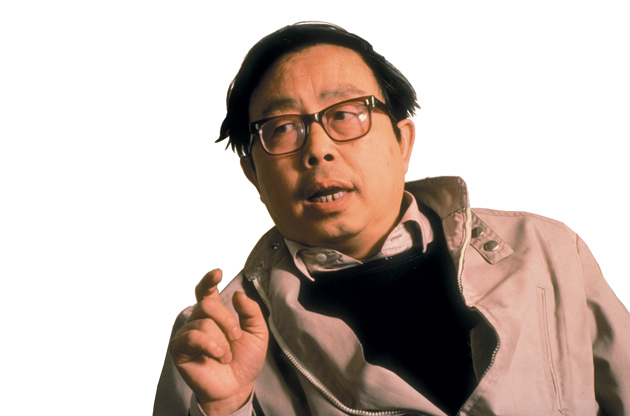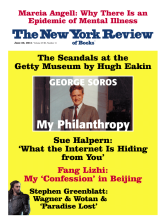From reading Henry Kissinger’s new book On China,1 I have learned that Mr. Kissinger met with Deng Xiaoping at least eleven times—more than with any other Chinese leader—and that the topic of one of their chats was whether Fang Lizhi would confess and repent.
On June 3, 1989, Deng, chair of the Military Commission of the Communist Party of China, ordered tanks from Chinese field armies into Beijing to suppress students who were demonstrating peacefully at Tiananmen Square. On the night of June 5, Raymond Burghardt, political counselor in the US embassy in Beijing, came to the hotel where my wife, Li Shuxian, and I were temporarily staying and invited us to “take refuge” in the embassy as “guests of President Bush.” He said we could stay as long as we needed. The matter soon became a point of contention in US–China relations.
About five months later, on November 9, Deng received, as he described him, his “old friend” Henry Kissinger and brought up “the Fang Lizhi case.” Deng told Kissinger that he was prepared to release the Fang family, expelling them from China “if the American side required Fang to write a confession.” Kissinger replied that if Fang were later to say that the American government had forced him to confess, things would be worse than if he had not confessed.
The American ambassador, James Lilley, relayed the gist of this Deng–Kissinger exchange to Li Shuxian and me, inside the embassy. Lilley, referring to the confession as “one of” Deng’s conditions, made it clear that he was only transmitting the message, not asking for a confession. We were “the guests of Bush”; what kind of host asks a guest to confess? I felt a bit sorry for the ambassador, who clearly was caught in a dilemma: he could not ask for a confession, and could not meet Deng’s condition, either. I told him to relax—Deng’s condition would not be all that hard to satisfy. I knew things about Chinese Communist “confession culture” that Lilley and Kissinger probably did not understand.
Anyone who has lived through political campaigns in recent Chinese history knows this much about the confession culture: solving a “problem” has little if anything to do with actual repentance or admission of guilt. So long as the underlying problem remains, no number of “confessions” changes anything. And once the underlying problem is solved, the lack of a confession never stands in the way. During the high tide of the Cultural Revolution, many Chinese scientists, including me, had to hand in confessions every day, and each confession was supposed to show “new” and “deeper” introspection on what we had found wrong in ourselves. One method we used in handling this demand was to spend a half-hour copying what we had written the day before (or maybe the day before that) while simply jumbling the order of the paragraphs. We would copy paragraphs A, B, C, and D but put them in the order C, B, D, A. This was enough to serve as our “new” introspection. We later learned that even the reordering had been unnecessary because the authorities, who were living in their own ruts, were not reading what we wrote anyway.
In short, “confessions” in this culture are formalities. They have more to do with face than with actual negotiations. The confession that Deng Xiaoping presented to Mao Zedong is a famous example. In early 1970, when Deng learned that Mao was considering whether to exonerate him, allowing him to return to power, Deng quickly wrote a “guarantee to Chairman Mao” in which he vowed “never to reverse course.” This letter gave Mao face to do what in any case he was inclined to do.
On the same principle, then, if Deng really wanted to solve the Fang Lizhi problem, there was no reason why I shouldn’t give him a bit of face in order to let it happen. So, on my own initiative, I wrote out an “account” in two parts: “concerning the past” and “concerning the future.” Not a word of it admitted any mistake or confessed any crime, but it was verbiage and it might serve a purpose. (A translation of this statement is available at nybooks.com/u/7)
On November 18 and again on November 24, Ambassador Lilley met with Deputy Foreign Minister Liu Huaqiu and presented him, among other things, with my “account,” which probably still rests somewhere in the ministry’s archives. No one in the government ever commented on it, so far as I know. (It is conceivable to me that, just as during the Cultural Revolution, no one ever read it.) In any case, by early December there was considerable optimism in the US embassy that the Fang Lizhi problem could soon be moved off the table.
Advertisement
On December 9, William Stanton, the embassy’s political officer, in a mood of visible excitement, came to us bearing good news. President Bush had dispatched his national security adviser, Brent Scowcroft, on another mission to Beijing. (Scowcroft had been sent on such a mission before, in secret, shortly after the crackdown at Tiananmen.) Scowcroft was arriving that very day, and Ambassador Lilley felt it likely that Scowcroft and Deng could seal a deal that would let Li Shuxian and me leave China with Scowcroft on his return flight. “Pack your bags!” Stanton said. “You may be free tomorrow!”
On the morning of December 10, with bags all set to go, we waited for marching orders. And waited…and waited. Till evening. Nothing.
Only later did we come to understand what had happened. The Chinese Minister of Foreign Affairs, Qian Qichen, had held a welcoming banquet for Scowcroft on the evening of December 9. At the time, US sanctions against China, including suspension of economic aid and a ban on visits by US high-level officials, were still in force. For this reason Scowcroft was hoping that the banquet would be low-key, without media coverage or any photographs. If it were publicized, he would have a lot of explaining to do when he got back to America. His hosts agreed: the media would be allowed only for a photo-op before the banquet; the banquet itself would be behind closed doors, out of view of the press.
The plan went ahead on that basis: the wine began to flow, toasts ensued, and everything was going smoothly. But when it came Scowcroft’s turn to thank his hosts, suddenly, out of the blue, a throng of reporters burst into the banquet hall, flashbulbs popping and video cameras trained on Scowcroft. Their obvious objective was to record Scowcroft’s words as proof that US–China relations had returned to normal. Such a thing could not have happened without official arrangement.
Scowcroft later wrote that this ambush had put him in an extremely awkward position. He had two choices: (1) stop the toast, turn around, and go home empty-handed; or (2) carry on with the toast knowing that the next day’s headlines in the US would likely read “Scowcroft Toasts the Butchers of Tiananmen.” After a hasty judgment of the pros and cons, he gritted his teeth and chose the second option.2 It was a gamble that his mission to Beijing might bring major breakthroughs, and that these would outweigh any media reports of his toast.
The toast itself, which was fairly lengthy, referred only once to the Tiananmen events and made no mention of tanks. It concluded with the words: “May I propose a toast to the People’s Republic of China, to the health of President Yang [Shangkun], to the great Chinese people, and to US–Chinese friendship?” (The full text of Scowcroft’s toast is also available here.) With this Scowcroft had certainly given his hosts enough face—much more than my own modest “account” had given.
The next day (i.e., the day that my wife and I had spent “awaiting orders”), Scowcroft was busy paying official calls on all of the brass of Beijing: Foreign Minister Qian Qichen, Premier Li Peng, General Secretary Jiang Zemin, and finally Deng Xiaoping. Only at this point did Deng tip his hand to reveal his bottom line on the Fang negotiation. Money was the crux. In exchange for the release of Fang, Deng wanted not just a piece of paper from Fang but three items from the US: lifting of US economic sanctions, resumption of loans, and an invitation to Jiang Zemin to visit the US.
Scowcroft replied that the US could not view a solution of the Fang Lizhi problem as a negotiating item on the same level as the lifting of economic sanctions. This approach would never be accepted in Washington. A solution to the Fang problem would certainly be of help on the sanctions question, but “linkage” was out of the question. There could be no “package solution.”
Deng Xiaoping and his people then adhered to the standard operating procedure in this oldest of trades: no ransom, no release.
With nothing to negotiate, the talks collapsed. Deng’s key condition (the ransom) had not been met. It could not have been plainer that the issue of confession, which had initially been reported as one of Deng’s conditions, was mere window-dressing.
In June 1990, the government of Japan promised to resume loan programs to China on condition that the Fang Lizhi problem be solved. Deng was “quick to act” (James Lilley’s phrase), and after only ten days, from June 16 to June 25, we were able to leave the embassy and leave China. No need for confession. This again demonstrated the principle that “once the underlying problem is solved, the lack of confession never stands in the way.” (But while Deng did not ask me to write anything at that juncture, Bob Silvers of The New York Review did. He wanted my views from the embassy, and I wrote a piece for these pages called “The Chinese Amnesia,” which I finished on June 25, only hours before departing.3)
Advertisement
During the year that I spent in the embassy, friends in the physics department at the University of Rome wrote to me about another confession culture with which they were familiar: the culture of obsequiousness in the medieval Roman Church. In that era, when people were also living in fear of authoritarian power, it was acceptable to write things like “I confess my guilt” or “I beseech the pardon of the great, knowledgeable, charitable [somebody]”—because God would forgive falsehoods that were written under such circumstances.
Even the great physicist Galileo stooped to such language when he addressed potentates with phrases like “I, Galileo,…kneeling before you Most Eminent and Most Reverend Cardinals….”4 Some of my Italian friends, feeling excessively nervous on my behalf, actually sent me drafts of confessional language that they thought I might use to get me through my crisis. In all I received three complete drafts of ready-to-go confessions. But I suspect that these drafts were not original creations; they were probably copied from one of those medieval “manuals of confession.”
Perhaps, in the future, someone should compile a “manual of confessions” from Communist China. Deng Xiaoping’s “guarantee to Chairman Mao never to reverse course” could be the lead item.
-
1
Penguin, 2011; see Jonathan Spence’s review in these pages, June 9, 2011. ↩
-
2
George Bush and Brent Scowcroft, A World Transformed (Knopf, 1998), p. 174. ↩
-
3
The New York Review, September 27, 1990. ↩
-
4
The Galileo Affair: A Documentary History, edited and translated by Maurice Finocchiaro (University of California Press, 1989), p. 292. ↩




